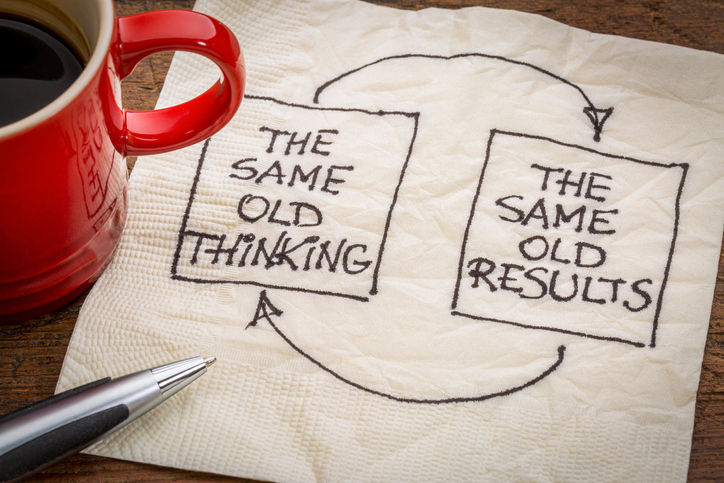 If you've ever had a minor setback and thought, "I guess I should just quit," you've been the victim of a thinking error. Thinking errors are distorted thoughts that occur when confronted with a situation. Unfortunately, human brains often jump to negative, worst-case-scenario thoughts before your rational mind can catch up to consider alternative responses.
If you've ever had a minor setback and thought, "I guess I should just quit," you've been the victim of a thinking error. Thinking errors are distorted thoughts that occur when confronted with a situation. Unfortunately, human brains often jump to negative, worst-case-scenario thoughts before your rational mind can catch up to consider alternative responses.
The good news is that you can learn to brush those negative thoughts aside with recognition and intention. Of course, they will still appear, but you can focus more on positive, rational responses.
Before diving into the thinking errors, let's briefly overview the Cognitive Triangle, a continuous feedback loop of Thoughts, Feelings, and Behavior.
Every situation we face leads to:
Example: You notice a stranger walking toward you in the park on a bright, warm spring day.
If your experiences in life up to this point have included pleasant interactions with strangers, your cognitive triangle may lead you to:
If you've been mugged or had other negative stranger interactions, your cognitive triangle may look more like this:
The cognitive triangle is not good or bad; it is just a way to describe the relationship between thoughts, feelings, and behaviors in any given situation. Your entire lifetime of experiences shapes how you act when presented with a new situation.
Now we can move into thinking errors. Thinking errors are irrational thoughts driven by faulty connections our brains make over time.
Every one of us is the victim of a thinking error from time to time. If you've ever thought you weren't good enough, if you've ever let a coffee stain ruin your day, if you've ever let your mind spin through worst-case scenarios, a thinking error has won.
A small inconvenience gets blown out of proportion into a much bigger deal than it needs to be.
Ignoring good experiences/emotions/situations to focus on negative ones is another easy trap to fall into.
You mistakenly believe you know what others are thinking, and they are only thinking negative thoughts about you.
First, you must recognize when you are falling into a thinking error. This will be hard initially but will become more automatic with time and repetition.
When you recognize a thought as negative, make a mental note. If you don't have time to examine it now, that's okay. You are just acknowledging that the thought was negative for now.
As you start to recognize negative thoughts, make time to ‘dive in' and examine them. Think about Best Case, Worst Case, and Most Realistic Case Scenarios. Tell yourself that the most realistic scenario is called ‘most realistic' for a reason!
Going back to the walk in the park example:
Once the situation has ended, reflect on how your thoughts affected your emotions and behaviors. The more you practice reflection, the easier it is to recognize how your thoughts, feelings, and behaviors affect one another. In time, positive thoughts can become your ‘default' rather than thinking errors.
This introduction to thinking errors is brief; there are so many more than the three described. The important thing to remember about all of them is that thinking errors are part of human nature. But human nature can be molded and changed.
You have the power to recognize thinking errors and reject what your brain is ‘telling' you. When you notice yourself blowing a thought up, focusing on the negative, or being a mind reader, call yourself out. Think of the other possibilities within that situation and kick those negative thoughts to the curb. With repeated recognition and focus, positive reactions will become your default.
https://www.therapistaid.com/worksheets/cbt-thinking-errors
https://www.therapistaid.com/worksheets/cbt-triangle
https://www.psychologytoday.com/us/blog/what-mentally-strong-people-dont-do/201501/10-thinking-errors-will-crush-your-mental-strength
https://positivepsychology.com/cognitive-distortions/#techniques-cognitive-distortions